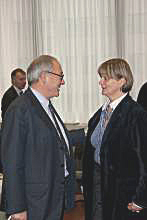 ESA Director General Jean-Jacques Dordain and European Space Council co-chair Sabine Laruelle, Belgian science minister. Photo: ESA – S. Corvaja
ESA Director General Jean-Jacques Dordain and European Space Council co-chair Sabine Laruelle, Belgian science minister. Photo: ESA – S. CorvajaWhile funding and technical issues continue to roil the waters at the program and operational level, Galileo and the European Geostationary Navigation Overlay Service (EGNOS) have received a strong reaffirmation of support from the highest levels of the European Union (EU) and the European Space Agency (ESA).
While funding and technical issues continue to roil the waters at the program and operational level, Galileo and the European Geostationary Navigation Overlay Service (EGNOS) have received a strong reaffirmation of support from the highest levels of the European Union (EU) and the European Space Agency (ESA).
At the November 25 meeting of the European Space Council — the seventh such gathering since ESA and the EU signed a “Framework Agreement” on space cooperation in 2004 — ministers in charge of space activities unanimously endorsed a resolution that called for the necessary actions to deliver a space strategy that supported the “flagship” Galileo and GMES (Global Monitoring for Environment and Security) programs as priorities for Europe.
The space council took place in parallel with a November 25–26 meeting of the Council of the European Union addressing core components of a new industrial policy contained in the Europe 2020 strategic initiative to create jobs and growth.
Despite the universal support for the resolution, it provided little tangible guidance for overcoming the funding shortfall that Galileo faces in the near future.
The space ministers’ statement recognized “that the development and operation of space programmes, which are by nature long-term and high risk activities, require specific financial means and implementing rules, as well as long-term commitments,” and reaffirmed “that it is a priority for the EU to seek their appropriate long-term financing for the period post 2013. . . .”
Those sentiments didn’t, however, address the need for additional funds to sustain Galileo’s development before then. Backers of the program in the European Parliament have said that new funds for Galileo need to be available in 2012 and 2013 and suggest that guarantees should be included in the 2011 EC budget.
On November 26 the European Commission (EC) adopted a new €126.5 billion (US$164.5 billion) draft EU budget for 2011 — an increase of 2.9 percent — after parliament and the council failed on November 15 to reach agreement on the terms of the budget. Parliament had sought a 6.91 percent increase.
A three-way tussle over the budget is now under way among European finance ministers (who generally resist additional funding for Galileo before 2013), parliament (where support for Galileo is fairly strong), and the EC. An earlier draft of the EC 2011 budget proposes expenditures of €524,593,415 for Galileo and EGNOS development, deployment, and launch of the operational phase. Some €47.7 million would be allocated for research, €8.2 million to the European GNSS Agency (GSA, up from €5.3 million in 2010), and €4 million for Galileo/EGNOS administrative costs within the EC Directorate-General for Enterprise.
Jerzy Buzek, president of the European Parliament, said on November 26, “Parliament is ready for an agreement on the 2011 budget within the limits set by the Council, provided EU governments accept Parliament’s request for budget flexibility and an agreement on a future working method for EU funding.”
The “flexibility” function” allows the EC to revise or adjust the financial framework within a contingency margin of up to 0.03 percent of the EU gross national income — a figure that is around €4 billion. That mechanism was used in the past to provide additional funding to the Galileo program to cover the costs of converting to an all-public development program rather than the public-private partnership previously proposed.
The entry into force last December of the Treaty on the Functioning of the European Union, better known as the Lisbon treaty, established space policy as an EU competence, thus strengthening its political dimension. The EU-ESA Framework Agreement, under which the Space Council was established, has been extended until May 2012.
At the November 26 meeting, ministers of the EU and ESA invited the European Commission and the Director General of ESA respectively to conduct an evaluation by May 2011 of the experience gained under that agreement.
ESA Director General Jean-Jacques Dordain emphasised the progress that had been achieved in space missions since the previous Space Council meeting in May 2009, adding, “The entry into force of the Treaty on the Functioning of the European Union, with a specific space competence, is good news for space, good news for Europe and good news for ESA. It allows us not to do the same thing differently but to do more, together.”
A European summit meeting schedule December 16–17 may provide the venue for resolving the budgetary stand-off.




